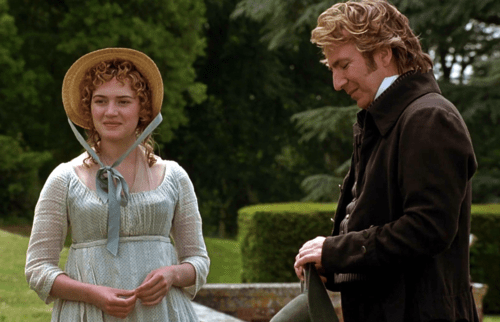
My big news is that the first draft of Colonel Brandon in His Own Words is finished! I don’t say “rough draft” because it’s already pretty refined, at least I think so. Soon, I will send it out to a few beta readers for their feedback, and then we shall see.
As you know from previous posts (here and here), this will be Colonel Brandon telling his own story, including, but not limited to, his perspective on the territory covered in the original novel. And as with my other books so far, it will supplement what Jane Austen has already told us, not change it. The rest comes from my imagination. Well, except that I admit that certain parts of this book may be inspired by glimpses we get from the movie adaptations.
A case in point: the picture above. Nowhere in the book does it say that Colonel Brandon reads to Marianne during her recovery. And yet it’s not incompatible with the facts we are given either. So, since I particularly like this image from the ’95 movie, I ended up incorporating the idea into my novel – not Brandon reading to her, but instead telling her, by installments, a story from his military years in India. It becomes part of their slow, tender courtship.
As I have been making another pass through the book, I came across the section below and decided to share it with you – partly for what it shows of their courtship, but also for what it says about the author/reader partnership in creating the enjoyment received from reading a good novel. We both have important roles to play!
About four days after Edward’s arrival, Colonel Brandon appeared, to complete Mrs. Dashwood’s satisfaction, and to give her the dignity of having for the first time since her living at Barton, more company with her than the house would hold. (Sense and Sensibility, chapter 49)
In this excerpt, Colonel Brandon is enjoying his first visit to Barton Cottage since Mrs. Dashwood, Elinor, and Marianne returned from Cleveland, where Marianne suffered her life-threatening illness. Here’s Colonel Brandon, telling this bit of the story in His Own Words… (PS – do imagine hearing it in Alan Rickman’s voice!)
I was in no hurry to go, having now the fresh reminder of the difference between my cold, solitary existence at Delaford and a home with the benevolent warmth of human companionship.
God had said it in the beginning, right there in Genesis. It is not good that the man should be alone. I will make him an help meet for him.
After Eliza, I had all but given up the idea that God had made another helper suitable for me. Now, however, gazing across the room at Marianne as the others chattered on excitedly about [Edward and Elinor’s] wedding plans, my heart dared to hope again. I prayed once more, perhaps for the thousandth time, that I and the vibrant, responsive beauty sitting by the window would someday be joined.
Therefore shall a man leave his father and his mother, and cleave unto his wife; and they shall be one flesh…
Marianne’s eyes darted my way, as if she had sensed I was looking at her. I was caught, but at least she could not read what my thoughts had been at that moment. In any case, I hoped not.
She smiled, though, and moved to sit nearer to me. “Thank you for your letter, Colonel,” she said. “Mama shared it with me and then asked me to read out to her what you had written of India.”
“I hope it did not bore you, Miss Marianne. Some people find such descriptions tedious.”
“Not at all! To be transported to a place I have never been and never will be… What could be more glorious than that?”
“My words had that effect?” I questioned, never having considered they could do so much.
“Oh, yes, at least for me. Mama said it must be partly my imagination too, for she could not so easily picture the scenes you described, and feel what it must have been like to be there.”
I pondered this a moment. “Yes, I think your mother is correct in saying so. That is the way with all kinds of storytelling, I believe. The teller can only do so much; part of the responsibility for success rests with the listener. Your cooperation in being a willing participant was vital to your own enjoyment of what I wrote, Miss Marianne. In a way, you created your own amusement.”
“I never thought of it in exactly those term, Colonel. Do you mean to say that even Shakespeare would not be brilliant without my help?”
Seeing mischief in her eye, I half smiled. “Perhaps that is taking it too far. I only meant that what I wrote was certainly not a work of genius; it was your interpretation that may have made it seem so.”
“Teamwork, then. That is the key – teamwork between reader and writer, listener and storyteller.”
“Precisely.”
“Then when shall we team up again? When shall I have the next installment of your story, Colonel Brandon?”
“Of Colonel Dunston’s story.”
“Yes, of course. That is what I meant, and yet you are doing your part.”
“We shall make time for it whilst I am here, I trust, for there is still much more to tell.”
What do you think? Do you like this interchange between them? Does it seem like something that could have occurred during the year before they finally married? Is Colonel Brandon just flattering Marianne, or is there something to his philosophy that teamwork between storyteller and listener is required? Is the relationship 50/50 or something else? What are your thoughts? As a reader, how much does your active participation count towards creating your own amusement?
















Active participation certainly contributes, even for people like me with no ability to visualize. With my aphantasia, it’s far less than half for me. On the other hand, my husband’s hyperphantasia probably contributes as much to his enjoyment as the written word. There is a Miss Marple actress that he dislikes because she’s too different from his mental picture of her.
Interesting perspective, Xena! Thanks for sharing. Sounds like together, you and your husband balance out perfectly!